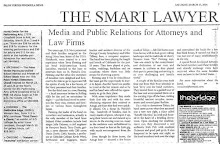[Update on June 26, 2010 Fired U.S. Army General McChrystal claiming his controversial comments in Rolling Stone were made 'off the record.' And Rolling Stones reporter Micheal Hasting refutes that with some very insightful comments on the concept of "off the record."]
While talking to a journalist there is no such thing as a comment made completely "off the record."
Why? Journalists have a professional obligation to collect information and share it with the public. They also gain status, pay raises, win awards and advance in their careers by having the most, best information the soonest.
So journalists have no incentive to ignore or bury what you tell them and every incentive to use it. When I was a journalist nothing in the world would set my head spinning worse than someone who wasted 20 minutes of my time chatting on the phone only to then say, "but you aren't going to print any of that. Right?"
Wrong.
There is no such thing as an official definition of "off the record," "on background," "not for attribution," "confidentially" or any other "safe harbor" framework that will allow you to tell a journalist anything that journalist will not convey to their audience. These are not legally defined terms you can rely upon like the terms of a contract. You may possibly learn to trust a particular journalist's discretion, but there is no official "time out."
In many ways your conversation with a journalist is just like a conversation with opposing counsel. If you can trust that person's discretion, great. If you cannot, or if you are not sure, then be discreet. But keep in mind that their interests and loyalties are not the same as yours.
Talking to a journalist is also much like being on the record in court. As an attorney you should put yourself in that same frame of mind: making a record. Do not say anything you would not want to see on the front page of your local paper.
Be professional, polite, accurate, discreet, while keeping your overall theme guiding your every comment. Do that and you will never go wrong.
Again. While talking to a journalist there is no such thing as a comment made "off the record."
From the time you start talking to a journalist on the phone, in a studio, in front of a camera or walking down the hallway at the courthouse everything you say or do is "on the record." Prepare and use discretion just as if you are in court, on the record.
The only "rule" [if you want to use that term] is that if a fact is in any way relevant it might go in the story.
If your receptionist tells a journalist that you announced "you are not wasting your time talking to any stupid reporter" that could end up in the story. Especially if the story is about disclosure, the 1st Amendment, or media relations. Or if you later deny avoiding public comments.
If you answer the phone while yelling at a subordinate and the journalist overhears, that could end up in the story. Especially if the story concerns allegations of aggression or courtroom antics or misbehavior or if you have a reputation as brash or rude.
If your cellular phone is ringing during the interview and the ring tone is noteworthy [Imagine allegations that you have a prior drunk driving conviction, your denials, and then your cellphone playing the song "Margarita-ville" loudly in the background...] even that could end up in the story.
Are there exceptions to this absolute "always on the record" baseline with journalists?
Maybe.
After you have established a long term relationship with a journalist, after that relationship has proven valuable to both of you, and after you have carefully tested the journalist's trustworthiness and discretion you might reach a point where you can trust that journalist with information you know they will not print on the front page. Maybe.
But such a relationship is just that; a personal relationship. It does apply to anyone else, not even to other journalists from the same media outlet. And that ad hoc confidentiality could end at any time if you have allowed yourself a foolish, indiscreet revelation the journalist thinks must be shared with the public.
Don't take that risk.
If you always treat every interaction with the media as if you are 'on the record' you will never have occasion to lose sleep regretting that ring tone.
Your reputation is your most valuable asset
Subscribe to:
Post Comments (Atom)







No comments:
Post a Comment